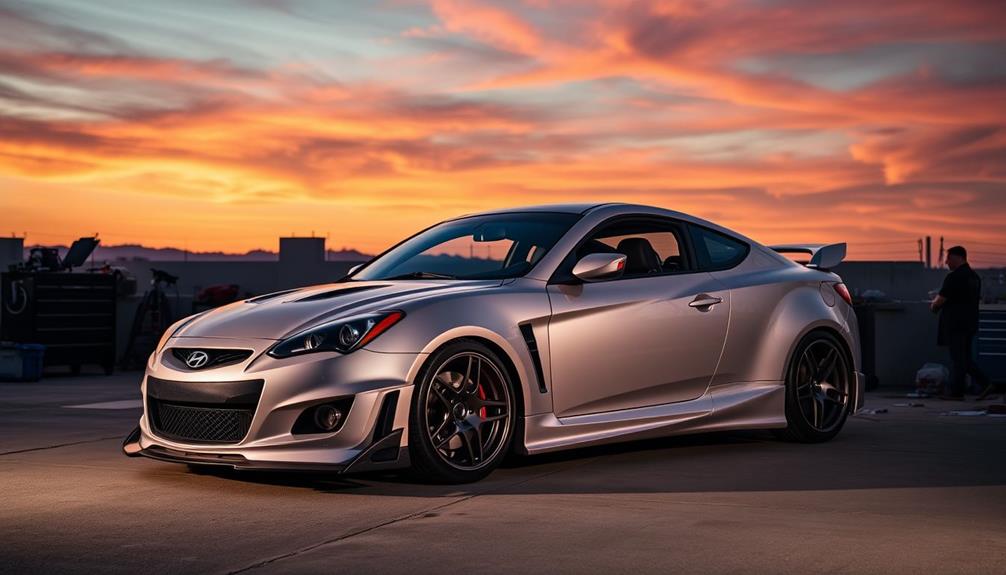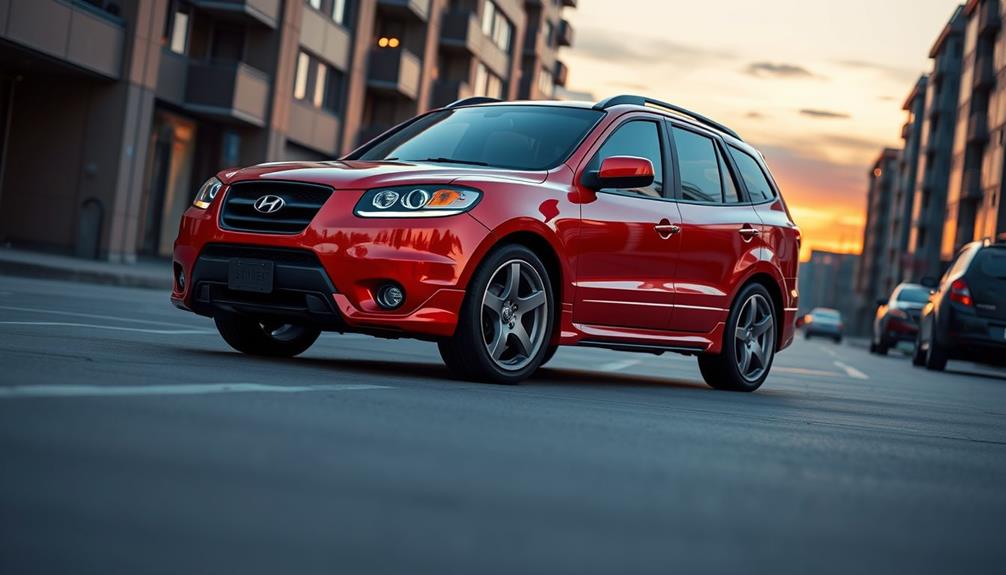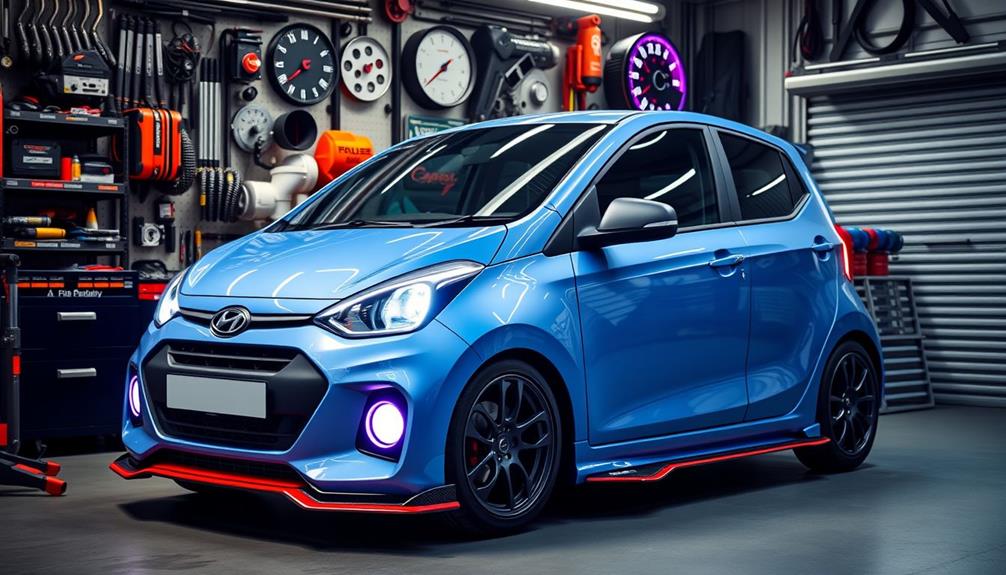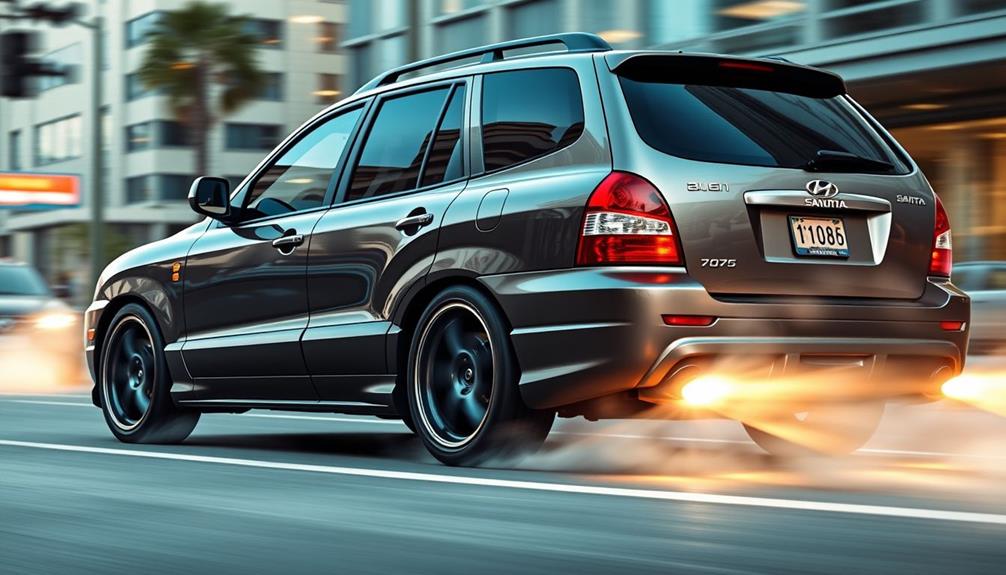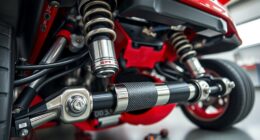Tuning your Hyundai Tiburon GT V6 is a game changer for performance. Start by aiming for 300 to 400 WHP through essential upgrades like turbocharging, intake, and exhaust systems. Keep boost levels under 10 PSI for engine reliability and consider ECU tuning for peak fuel delivery. Don't forget to enhance your suspension and brakes for better handling. Weight reduction strategies, like upgrading to lightweight materials, can also improve speed and responsiveness. With careful planning and maintenance, you'll maximize your sports coupe's potential. Keep exploring for the best tips and tricks to elevate your Tiburon's performance further. Consider investing in a good quality gasoline for maximum output, and regularly monitor and upgrade your fuel system to ensure consistent power delivery. Also, don’t overlook the importance of a quality set of tires to complement your improved suspension and handling upgrades. The Hyundai Tiburon tuning guide can provide valuable insights and recommendations for achieving the best performance out of your sports coupe. By following these guidelines and continually fine-tuning your car, you’ll experience a whole new level of exhilaration and satisfaction in driving your tuned Hyundai Tiburon GT V6.
Key Takeaways
- Upgrade the intake and exhaust systems to enhance airflow and performance in your Hyundai Tiburon GT V6.
- Install a turbocharger, like the Garrett T32 or T3, to significantly increase horsepower while managing boost levels under 10 PSI for reliability.
- Implement ECU tuning to optimize fuel delivery and ignition timing, ensuring maximum performance from your modifications.
- Focus on weight reduction by removing unnecessary components and using lightweight materials to improve acceleration and handling dynamics.
- Regularly maintain and tune your vehicle, including oil changes and dyno tuning, to ensure peak performance and reliability.
Performance Goals and Specifications
When tuning the Hyundai Tiburon GT V6, your primary performance goals typically revolve around achieving 300 to 400 WHP. To reach these targets, turbocharging is your best bet. The stock 2.7L V6 engine can handle up to 10 PSI of boost reliably, giving you a solid foundation for your modifications.
You'll want to focus on enhancing the air intake, exhaust, and intercooler systems to maximize airflow and efficiency. While the stock shortblock can technically support over 400 HP, it's vital to stay conservative with your tuning. Pushing beyond 15 PSI risks early failure of the piston rings, which can lead to costly repairs.
By carefully planning your upgrades, you'll help guarantee your engine's longevity while meeting your performance goals. Consider also investing in forged steel crank and full crank cradle enhancements to bolster your engine's durability under increased stress.
These modifications will give you peace of mind as you push for those impressive WHP numbers without compromising reliability. Remember, a balanced approach to tuning will yield the best results for your Tiburon GT V6.
Essential Engine Modifications
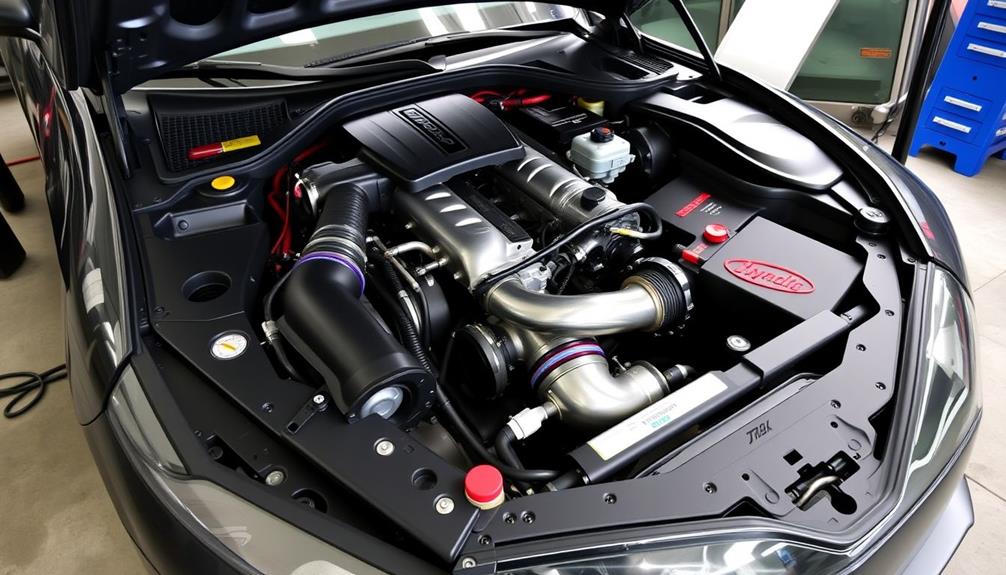
To access the full potential of your Hyundai Tiburon GT V6, fundamental engine modifications are essential.
First, upgrading the intake and exhaust systems greatly enhances airflow, which is critical for maximizing performance. A well-designed intake allows your engine to breathe easier, while a high-performance exhaust reduces back pressure, together transforming your driving experience.
Consider installing a turbo or supercharger, like the Garrett T32 or T3, to effectively boost horsepower. Keep your boost levels under 10 PSI for stock engines to guarantee reliability. Pairing this with performance camshafts will improve engine efficiency and power output, making a noticeable difference in acceleration.
Next, don't forget about ECU tuning. This adjustment is fundamental for optimizing engine parameters, enabling better fuel delivery and ignition timing.
To support the increased air intake from forced induction, you'll need upgraded fuel injectors and a high-flow fuel pump. These components assure proper fuel atomization and delivery, maximizing the benefits of your modifications.
Incorporating these fundamental engine modifications will set you on the path toward an exhilarating driving experience in your Tiburon GT V6.
Turbocharger Options and Boosting

Many enthusiasts find that adding a turbocharger to their 2003-2008 Hyundai Tiburon GT V6 can dramatically elevate performance. When considering turbocharger options, the Garrett T32 or T3 are highly recommended for their significant enhancements.
For the stock 2.7L V6 engine, it's best to keep boost levels under 10 PSI initially, though you can push it up to 21 PSI with proper tuning and modifications.
Installing a turbocharger usually requires a budget of around $3,000 for the kit and an additional $1,500-$2,000 for professional installation. Remember, fuel management adjustments are vital to fully harness the added power. Upgrading to larger fuel injectors and reprogramming the ECU are important steps to accommodate the increased air intake from your new turbo.
Maintaining engine reliability under boosted conditions is essential, so you'll need to invest in a boost controller and guarantee careful tuning. You might also consider modifications like a thicker head gasket to lower compression.
With the right turbo setup and adjustments, you'll transform your Tiburon GT V6 into a powerhouse on the road.
Recommended Upgrades for Power
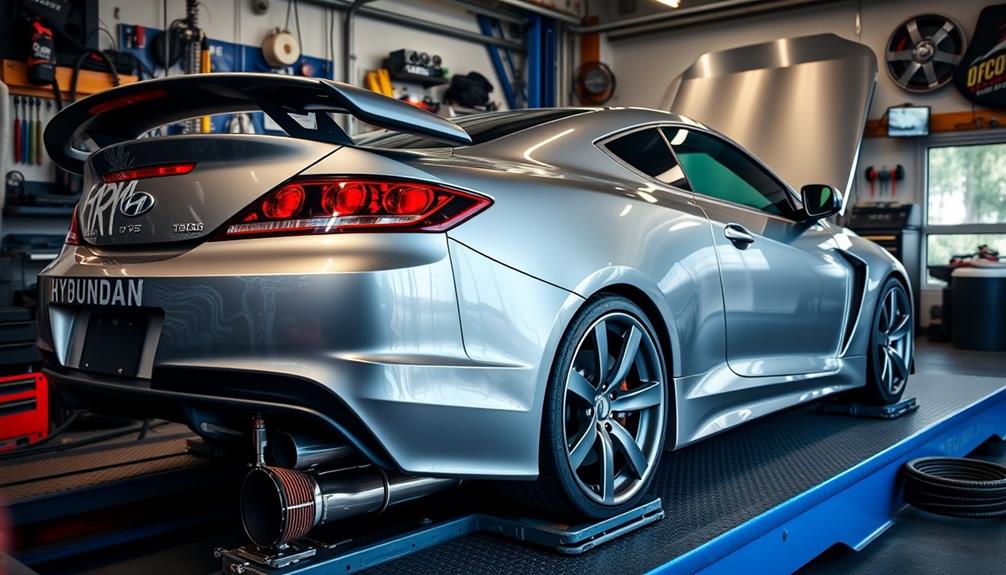
After adding a turbocharger, it's time to contemplate other upgrades that can further enhance your Tiburon GT V6's power. One of the first things you should consider is installing a high-flow fuel management system. Larger fuel injectors and a remapped ECU are essential for optimizing fuel delivery, especially when you're pushing for that 300-400 WHP range.
Next, focus on your intake and exhaust systems. Upgrading to a cold air intake will improve airflow and throttle response, while aftermarket headers and a cat-back exhaust system will enhance exhaust flow. This combination not only boosts performance but also gives your Tiburon a more aggressive sound profile.
Don't forget about the engine's load; incorporating lightweight pulleys can further reduce strain on your powerplant.
Finally, remember that with increased power comes the need for better stopping capabilities. Upgrading to high-performance brakes, like Brembo calipers, will guarantee you can safely manage that extra horsepower.
These upgrades will maximize your Tiburon GT V6's potential, creating a well-rounded sports coupe that's not just fast, but also reliable and fun to drive.
Weight Reduction Strategies
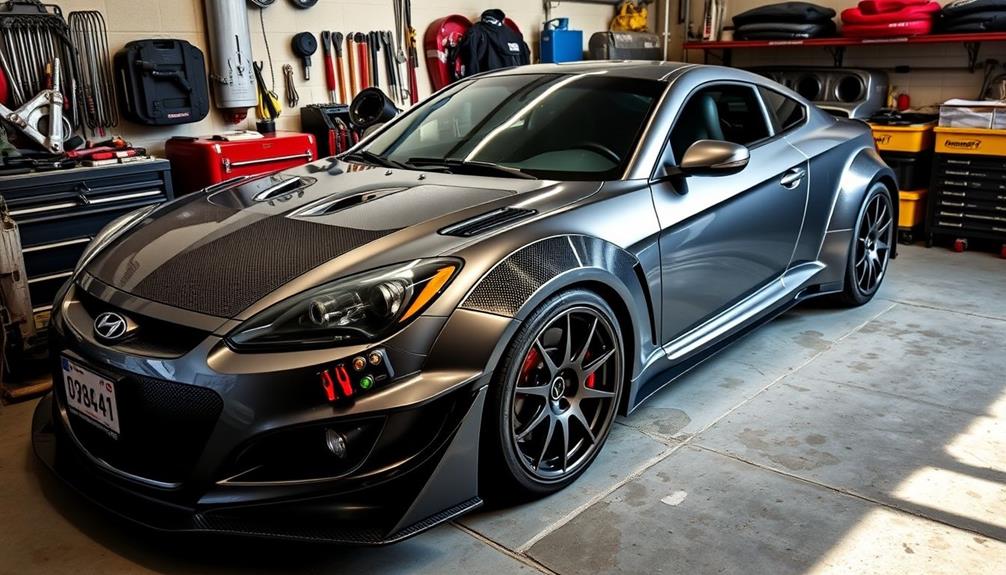
To boost your Hyundai Tiburon GT V6's performance, consider removing unnecessary components like rear seats and spare tires.
Upgrading to lightweight materials, such as carbon fiber body panels, can also make a noticeable difference in weight.
These strategies not only enhance acceleration but improve handling dynamics as well.
Essential Component Removal
When it comes to enhancing the performance of your Hyundai Tiburon GT, shedding unnecessary weight is an essential step.
Essential component removal, like taking out the rear seats and sound deadening materials, can greatly lighten your car. This weight reduction leads to improved acceleration and handling, allowing you to navigate corners with more agility.
Consider upgrading to lightweight wheels to reduce rotational mass, which enhances responsiveness and handling dynamics.
You can also replace stock body panels with carbon fiber alternatives for considerable weight savings without compromising structural integrity, supporting overall performance gains.
Utilizing racing or lightweight seats instead of the stock ones can yield impressive results, shedding up to 50 pounds per seat.
Additionally, relocating the battery to a lighter model or moving it to the trunk can improve weight distribution and lower your car's center of gravity. This change further enhances handling, especially during spirited driving.
Lightweight Material Upgrades
How can you effectively reduce weight while boosting performance in your Hyundai Tiburon GT? By focusing on lightweight material upgrades, you can enhance your car's dynamics and acceleration. Here are three strategies to contemplate:
- Carbon Fiber Body Parts: Replace stock components with carbon fiber alternatives. These parts greatly reduce weight while maintaining strength, improving overall vehicle performance.
- Lightweight Wheels: Upgrade to lightweight wheels. This not only decreases rotational mass, leading to better acceleration, but also improves handling, giving you a more responsive driving experience.
- Weight Distribution Enhancements: Think about relocating your battery to a lighter model or repositioning it within the vehicle. This adjustment can enhance weight distribution, improving your Tiburon's handling and performance dynamics.
Additionally, swapping out stock seats for racing seats can provide substantial weight savings and better support during aggressive driving.
You might even remove unnecessary interior components, like rear seats or sound deadening materials, to further decrease your car's overall weight.
Embrace these upgrades, and you'll maximize your Tiburon GT's potential!
Tuning and Calibration Techniques
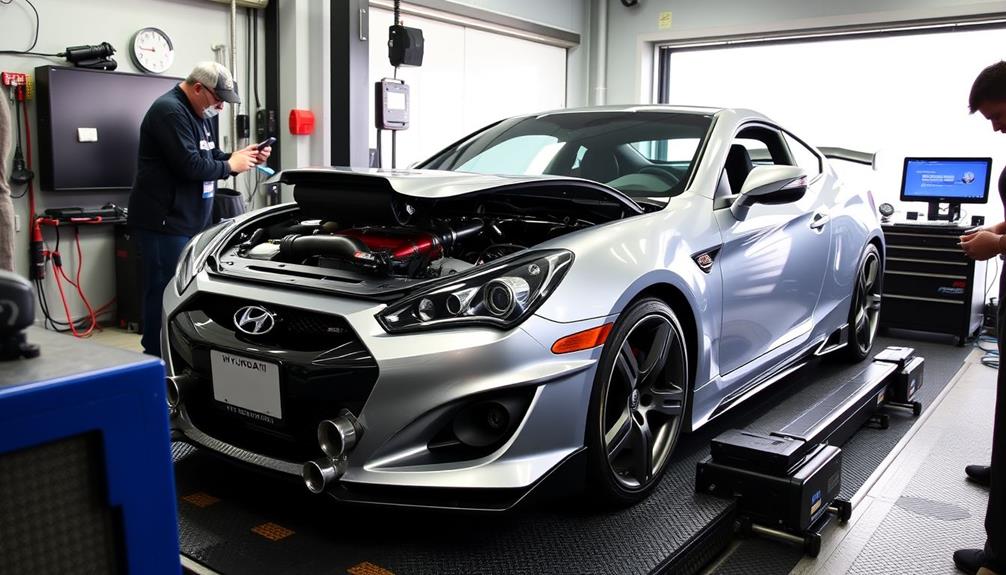
Tuning and calibration techniques are critical for accessing the full potential of your Hyundai Tiburon GT V6. One of the first steps you should consider is ECU tuning, which optimizes engine parameters for improved throttle response and overall power output. This adjustment guarantees your engine runs at its best, especially when you've made other modifications.
Next, dyno tuning is essential. It allows you to make precise adjustments based on real-time performance data, ensuring that your modifications yield maximum power gains while maintaining engine reliability. This method helps you fine-tune fuel maps, enhancing fuel delivery efficiency—important when increasing boost levels with forced induction systems.
Don't overlook ignition timing adjustments, either. These can greatly increase horsepower, making them a key focus in performance tuning.
Finally, installing performance chips can further elevate your engine's performance by allowing greater control over engine parameters, leading to improved power and efficiency.
Suspension and Handling Enhancements
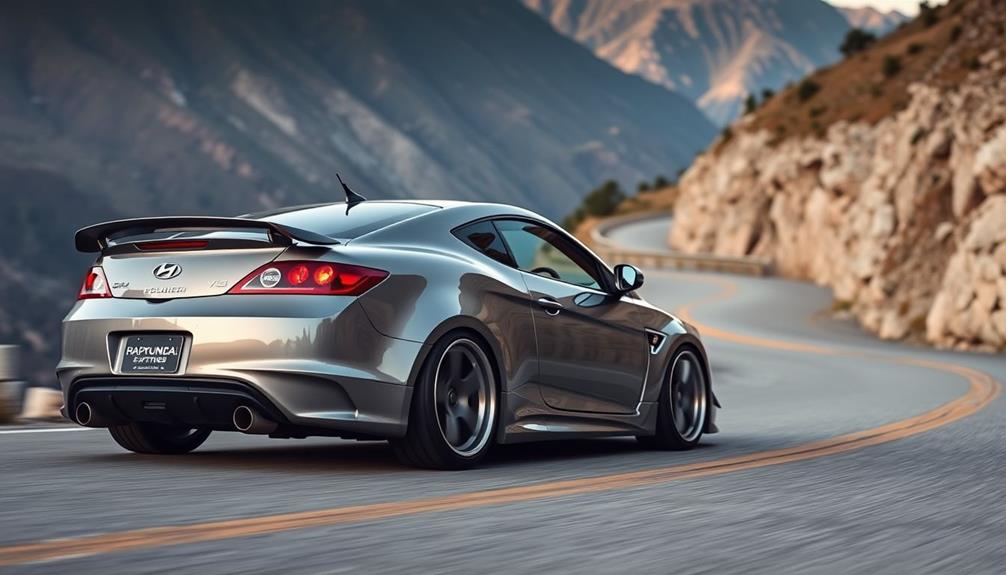
When it comes to enhancing your Hyundai Tiburon GT V6, upgrading to a coilover suspension system gives you adjustable ride height for better handling and cornering.
Pair this with lightweight wheels, and you'll notice improved acceleration and responsiveness.
Together, these modifications lay the groundwork for a sportier and more enjoyable driving experience.
Upgraded Coilover Suspension Systems
Upgraded coilover suspension systems are a game-changer for your Hyundai Tiburon GT V6, offering the ability to fine-tune your ride for both street cruising and track days.
With the right coilover setup, you can drastically enhance handling, reduce body roll, and improve cornering stability, making your driving experience more responsive and exhilarating.
Here are three key benefits of investing in upgraded coilover suspension:
- Adjustable Ride Height: You can lower your Tiburon for a sportier look and improved aerodynamics or raise it for better clearance on rough roads.
- Damping Customization: Fine-tune rebound and compression settings to match your driving style, whether you're hitting the track or enjoying a casual drive.
- Enhanced Comfort: Quality coilovers strike a balance between performance and comfort, allowing you to enjoy a smooth ride without sacrificing drivability.
Brands like BC Racing and Tein provide kits tailored for the Tiburon GT V6, ensuring both aesthetics and performance are enhanced.
Upgrading your coilover suspension not only transforms your ride but also elevates your driving experience to new heights.
Performance Brake System Enhancements
Enhancing your Hyundai Tiburon GT V6 with a high-performance brake system is important for maximizing both safety and driving enjoyment. Upgrading to brands like Brembo or Wilwood greatly boosts your stopping power while reducing brake fade, especially when you've increased horsepower through engine modifications. Larger rotors and upgraded brake pads enhance heat dissipation, ensuring ideal braking performance during spirited drives or track sessions.
Additionally, swapping out factory rubber hoses for stainless steel brake lines gives you a more consistent brake feel and response, essential for various driving conditions. A performance brake booster can further improve pedal feel and responsiveness, allowing for better modulation and control during aggressive maneuvers. Regular maintenance, such as flushing brake fluid and replacing worn components, is also crucial to maintain reliable performance as your Tiburon's speed and handling capabilities increase.
| Upgrade Component | Benefits |
|---|---|
| High-Performance Pads | Improved grip and reduced fade |
| Larger Diameter Rotors | Enhanced heat dissipation |
| Stainless Steel Lines | Consistent brake feel |
| Performance Brake Booster | Better modulation and control |
Lightweight Wheel Options
To truly release the potential of your Hyundai Tiburon GT V6, investing in lightweight wheels can make a world of difference.
Upgrading to lightweight wheels greatly reduces unsprung weight, enhancing acceleration, braking, and overall handling performance.
When selecting performance wheels, consider the following:
- Size Matters: Opt for wheels in the 17 to 18-inch range. This size strikes a perfect balance between style and performance without sacrificing ride quality.
- Material Choice: Lightweight alloy wheels, typically crafted from aluminum, weigh between 15 to 20 pounds each. In contrast, stock wheels can weigh 25 pounds or more. This reduction in weight leads to quicker steering response and improved cornering stability.
- Proper Offset: Verify your wheels have a proper offset, ideally between +35 to +45 mm for the Tiburon GT. This assures ideal fitment and minimizes potential suspension clearance issues.
Budget Planning for Modifications
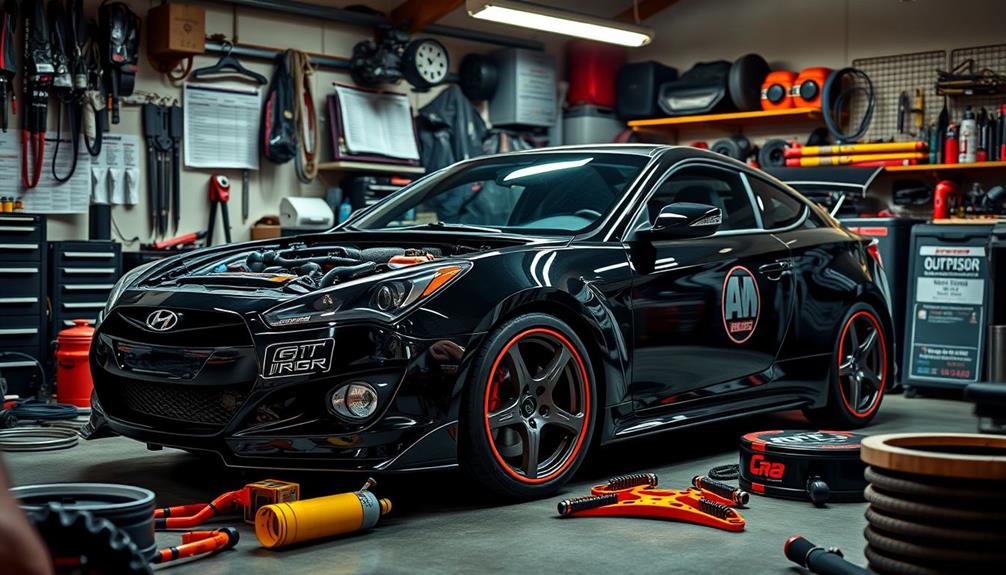
A solid budget is vital when planning modifications for your Hyundai Tiburon GT V6. Start with an initial budget of around $7,000 for performance upgrades, but be open to increasing it to $8,000-$9,000 if you decide on additional modifications.
Effective budget planning is important; prioritize essential upgrades first. Focus on your intake, exhaust, and fuel management systems before considering any cosmetic enhancements.
Don't forget to factor in labor costs, as professional installation can add an extra $1,500-$2,000 to your total expenses. If you're handy, exploring DIY options can help you save money.
A thorough plan will help prevent overspending on piecemeal upgrades, so keep track of your expenses to stay within your limits.
Also, consider the long-term costs associated with maintenance and potential repairs due to your modifications. Verify that your investment aligns with your performance goals, allowing you to enjoy your Tiburon while managing your budget effectively.
Community Resources for Support
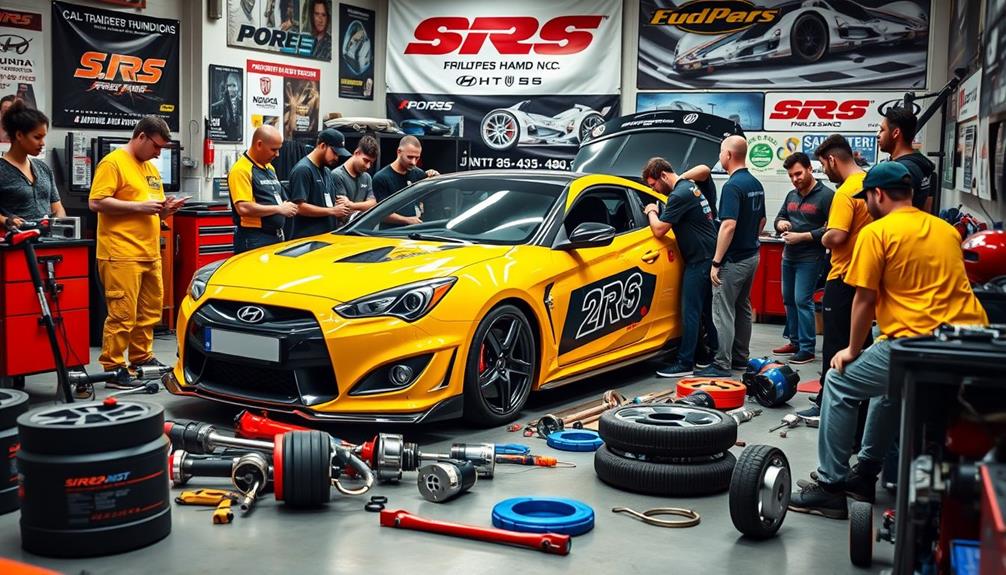
Finding support within the Hyundai Tiburon community can greatly enhance your tuning experience. Connecting with fellow Tiburon owners not only provides valuable insights but also fosters a sense of camaraderie as you initiate your performance upgrades.
Here are three resources to reflect on:
- NewTiburon.com: This dedicated forum is a goldmine for Tiburon owners. You'll find shared experiences, tips, and advice on performance modifications tailored specifically for the GT V6 model.
- NGM House of Power: They offer extensive resources and expert insights on tuning and performance upgrades. Their recommendations can guide you through the tuning process, ensuring you make informed decisions.
- YouTube: Numerous channels provide visual guides and tutorials on installation and modification techniques. Watching these videos can demystify the process and give you the confidence to tackle upgrades on your own.
Maintenance for Optimal Performance
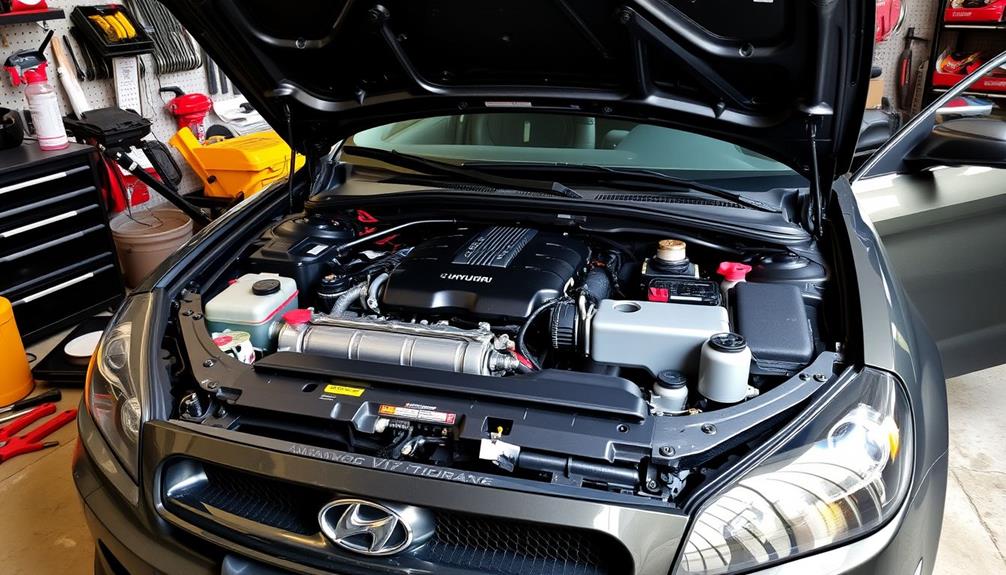
Maintaining your Hyundai Tiburon GT V6 is just as important as the tuning upgrades you undertake. Regular oil changes with high-performance synthetic oil will considerably reduce engine wear and enhance efficiency.
A clean air filter or a high-flow filter upgrade is necessary; it boosts airflow to the engine, leading to ideal combustion and increased power output.
Don't underestimate the importance of using high-octane fuel. It helps improve your engine's performance, enhancing ignition efficiency and preventing knocking, especially when you've made performance modifications.
Additionally, maintaining proper tire pressure is essential. It maximizes traction and handling, directly impacting your vehicle's performance and safety.
Routine inspections of your braking system and suspension upgrades are crucial too. As you push your Tiburon to higher speeds, these components must be in top shape to handle the extra power safely.
Neglecting maintenance can lead to serious issues down the line, undermining all the effort you've put into tuning. By staying on top of these maintenance tasks, you guarantee that your Tiburon not only performs at its best but also remains reliable and safe on the road.
Frequently Asked Questions
What Is the Top Speed of the Hyundai Tiburon GT V6?
The top speed of the Hyundai Tiburon GT V6 is about 140 mph. However, factors like modifications, weight, and tire conditions can affect this figure, so yours might vary based on those elements.
Is a Hyundai Tiburon a Sports Car?
Imagine a cheetah sprinting across the savannah; that's what driving a Hyundai Tiburon feels like. Yes, it's a sports car, with its sleek design and agile handling, bringing excitement to every twist and turn.
What Is the 0 60 Time for the Hyundai Tiburon?
The Hyundai Tiburon typically hits 0-60 mph in about 6.7 to 7.0 seconds. With some performance modifications, you might reduce that time to around 5.5 to 6.0 seconds, depending on various factors.
Is the Tiburon GT a Good Car?
Yes, the Tiburon GT's sporty design and agile handling make it a fun drive. While it lacks premium interior quality, its affordability and customization options attract enthusiasts looking for a budget-friendly sports coupe.
Conclusion
In your journey to maximize the power of your Hyundai Tiburon GT V6, remember that every little bit counts. With the right engine modifications, turbocharger options, and upgrades, you can transform your coupe into a true powerhouse. Don't forget to lighten the load and enhance your suspension for better handling. As you engage in this project, keep your eye on the prize, and soon you'll be cruising with a car that truly roars!
